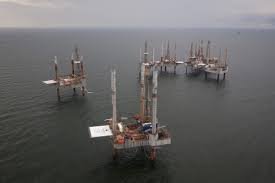
Amidst a pivotal juncture in the energy sector, major oil conglomerates are orchestrating a seismic contest to secure drilling rights in the Gulf of Mexico. This offshore auction, set against the backdrop of a rebuffed Biden administration initiative, is on the verge of reshaping the panorama of offshore exploration. With an astounding bid of $382 million on the table, the titans of the industry are diligently leaving no stone unturned in their pursuit to dominate one of the most prolific oil and gas regions across the globe.
The Mexico’s Economic Theater:
The Gulf of Mexico, an enduring bastion of energy prowess, assumes the spotlight as oil magnates assemble for an auction enveloping an expanse of approximately 73 million acres. This offshore transaction, choreographed by the Bureau of Ocean Energy Management (BOEM), is heralded as the most financially lucrative since the agency’s inception. The bidding fracas, driven by an ardent ambition to harness the region’s expansive energy potential, has set the industry abuzz.
Effortlessly transitioning from the recent legal rebuffs of the Biden administration’s plans, oil behemoths are now strategically poised to wield their influence and assert dominance in this economic arena. The $382 million bid not only signifies a substantial fiscal commitment but also underscores a calculated move to establish a firm grip on the Gulf’s offshore drilling milieu.
Principal Contenders and Their Calculated Maneuvers:
A consortium of major players has thrown their hats into the ring, each armed with strategic gambits aimed at outmaneuvering their competitors. The impending bidding skirmish portends to be fierce, with each corporate entity vying for a share of the Gulf’s energy bounty.
Environmental Apprehensions:
As the bidding spectacle unfolds, environmental apprehensions cast a looming shadow over the proceedings. Activists and conservationists harbor concerns regarding the potential repercussions of intensified drilling activities in the Gulf of Mexico. Recent legal setbacks, ostensibly tied to the safeguarding of an endangered whale species, underscore the delicate equilibrium between economic interests and environmental preservation.
Juggling Act
Economic Advantages vs. Environmental Ramifications: The economic promise encapsulated in the $382 million bid must be judiciously weighed against the potential environmental ramifications. Offshore drilling, though economically alluring, bears the historical stain of environmental calamities. The Deepwater Horizon incident in 2010 serves as a stark reminder of the perils involved. Industry players are now confronted with the task of persuading stakeholders that technological advancements and safety measures adequately mitigate these risks.
Potential Environmental Implications:

While the auction promises considerable economic windfalls, reservations regarding the environmental impact of offshore drilling persist. Environmentalists and conservationists express trepidation about potential harm to marine life and ecosystems, especially in light of recent legal setbacks related to the Biden administration’s plans. The bid also raises queries about the industry’s commitment to sustainable practices.
Governmental Reaction:
Amidst the bidding fervor, the Biden administration finds itself tasked with responding to the industry’s eagerness to exploit the Gulf’s resources. The rejection of prior plans adds a layer of complexity to the situation, necessitating the government to navigate a path that balances energy development, environmental preservation, and legal considerations.
Governmental Response and Regulatory Scrutiny:
The response of the Biden administration to the bids and the ensuing regulatory scrutiny will be scrutinized closely. As the government endeavors to assert its authority in managing offshore resources, questions emerge concerning the alignment of national energy policy with environmental stewardship.
Industry Trends and Prognosis:
Beyond the imminent auction, the developments in the Gulf of Mexico reflect overarching industry trends. Ongoing advancements in technology and exploration techniques continue to propel the oil and gas sector’s capacity to extract resources from challenging environments.
Technological Progression and Future Outlook:
The Gulf of Mexico remains a crucible for technological innovation in offshore drilling. With companies allocating substantial resources to research and development, the industry is poised to delve into deeper and more challenging realms. The outcome of the auction is likely to exert an influence on the trajectory of technological investments in offshore exploration.
Communal Ramifications:
However, as the industry gears up for technological progress, the impact on local communities cannot be disregarded. The auction’s outcome will bear direct implications for the economies of communities surrounding the Gulf. Employment opportunities, economic development, and social well-being are intricately linked to the industry’s activities.
Community Impact and Socioeconomic Considerations:
Local communities, often reliant on the energy sector for sustenance, find themselves at the crossroads of economic gains and potential environmental hazards. The delicate balancing act between community interests, economic benefits, and environmental conservation poses a formidable challenge for both industry players and policymakers.
The $382 million bid for drilling rights in the Gulf of Mexico signifies a watershed moment for the oil and gas industry. The economic gains, environmental considerations, and geopolitical implications render this auction a focal point for industry observers, environmental advocates, and policymakers alike.
A Pivotal Epoch for Offshore Exploration:

As the bidding skirmish unfolds, the oil and gas industry stands at the precipice of a new era in offshore exploration. The Gulf of Mexico, with its abundant energy reservoirs, beckons as a frontier for technological innovation and economic expansion. However, the industry’s success in navigating the delicate equilibrium between economic interests and environmental responsibility will not only shape the future of offshore drilling but also influence the broader narrative of sustainable energy development.










